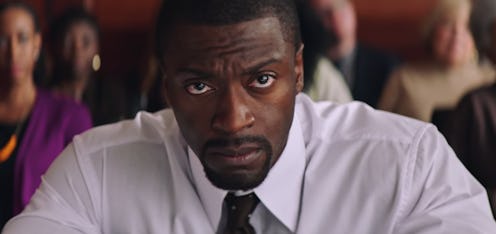Entertainment
How One Wrongfully Accused Football Player Helped Tell His Own Story

The biographical drama Brian Banks, which comes to theaters Aug. 9, focuses on one man's struggle to prove his innocence after being accused of sexually assaulting a classmate. The film is based on the real Brian Banks, who would go on to play for the Atlanta Falcons for a brief period in 2013. His situation was complicated by several factors, which the movie endeavors to accurately portray.
Banks himself served as an executive producer for the film, per The Hollywood Reporter. Being in that position means that he would have had the opportunity to provide feedback on the project as it developed, potentially ensuring its faithfulness to his experiences with the criminal justice system. Banks was still in high school when he was accused, and a lot of the film focuses on what that accusation and some unfortunate advice from his legal team cost him, which included a scholarship to the University of Southern California and a chance at a professional football career.
According to Deadline, Banks said at an Essence Festival event that the dramatized version of his story is "for other people who are currently voiceless, who are experiencing a similar situation." He also commented on the potential impact this film could have on non-white viewers, saying, "For every young person of color who has had an encounter with a police officer or has been miscategorized or judged, this is one of those films where we talk about a real-life story that so many people can connect to and relate to. We need more stories like these, real-life stories turned into art so that we can learn."
Central to the story alongside Banks is the California Innocence Project (CIP), an organization dedicated to freeing people who have been wrongly convicted by the justice system. As they note in their account of Banks' case, while serving his sentence, Banks worked with the CIP to find a way to prove his innocence, but barring any major revelations, they were out of options. That is, until his accuser recanted her accusation, giving them the evidence they needed to exonerate Banks.
The film follows this aspect of the story fairly closely, with Banks (Aldis Hodge) finding an ally in Justin Brooks (Greg Kinnear), a defense attorney who steps in to take Banks' case pro bono. The real Justin Brooks is director of the CIP, and, along with Banks, is an executive producer on the film.
The CIP website claims, "The film closely follows Brian’s road to redemption, including the many legal obstacles he encountered when attempting to gain relief from the courts. While certain aspects have been changed, including the names of some involved in the case, the major story remains the same."
As pointed out by Variety and THR in their reviews of the film, a criticism that can be leveled against the film is its less-than-stellar timing. It made its film festival debut in the fall of 2018 amidst continuing conversation around the #MeToo movement and the Supreme Court nomination of Brett Kavanaugh. After its Los Angeles Film Festival screening, THR's Stephen Farber wrote that the film is "not exactly primed to win an appreciative audience at a time when men (including a Supreme Court nominee) are vehemently denying charges of sexual misconduct."
According to the Rape, Abuse, and Incest National Network, only 230 of every 1000 sexual assaults are reported to the authorities, with 13% of those who do not report citing their belief that the authorities wouldn't do anything if they did. In a conversation with Snopes about Banks' case, Laura Palumbo, spokesperson for the National Sexual Violence Resource Center, said, "When the rare case of a false report is misrepresented as a common occurrence, this creates additional barriers for victims coming forward. Misconceptions about false reporting rates have direct, negative consequences and can contribute to why many victims don’t report sexual assaults."
But to take Brian Banks and the true story behind it as "proof" that false accusations are common would be factual incorrect and also a misread of the movie itself. The film is less focused on the accusation itself and more on just how complicated cases such as these can be, which is an aspect that Variety's review of the film highlights.
Banks himself has spoken in support of sexual assault survivors, telling The Grio, "I think that people who have been sexually assaulted and want to speak up and seek justice for their experience should have the opportunity to do so. As someone who has been wrongfully convicted of rape, these are subjects I think we have to take our time with and be patient and investigate and make sure the right person is being held accountable."
It's also important to remember that the film also shows how Banks's experiences as a person of color differ greatly from those of most white people who've been accused. Speaking to The New York Daily News about Brock Turner, who was convicted of assault charges in 2015 and received a sentence that disturbed many, the real Banks said, "They gave me six years. They gave him six months."
If you or someone you know has been sexually assaulted, call the National Sexual Assault Telephone Hotline at 800-656-HOPE (4673) or visit online.rainn.org.